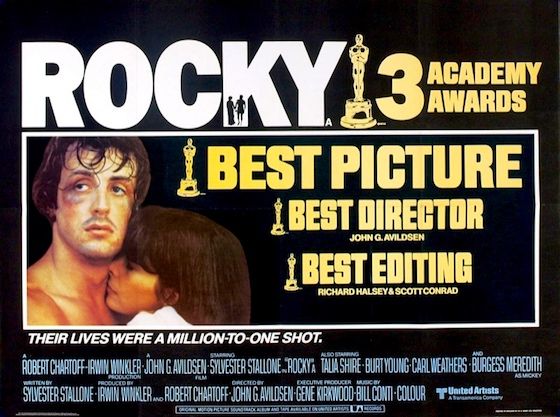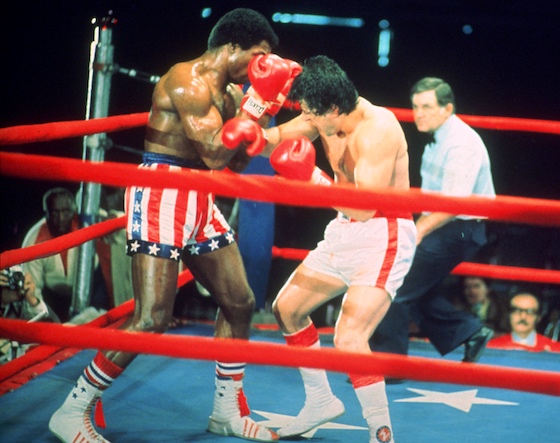John G. Avildsen | 120 mins | Blu-ray | 1.85:1 | USA / English | PG / PG

“His name is Sylvester Stallone. He’s the star of a new film called Rocky. He has been described as handsome, tough, talented, sexy, sensitive, dynamic, and brilliant. He’s been compared to Brando, Newman, Pacino, and De Niro. He’s been called “a top contender for an Academy Award”.
His name is Sylvester Stallone, but you will always remember him as… Rocky.”
So goes the narration to Rocky’s original trailers and TV spots. We don’t get trailers like that anymore, do we? Now we just get Bryce Dallas Howard pretending to roar like a T-Rex while encouraging us to join Odeon Première Club. (I’ve been forced to sit through that far too often, and I’ve only been to the cinema four times this year.) But I digress. The narration also indicates the road Stallone could’ve gone down — imagine if he’d made a career writing and starring in movies like this, following through on all those comparisons the trailer made, rather than going down the action meathead route. A weird thought now, isn’t it?
If you’ve never seen Rocky, you might assume it’s broadly similar to the films Stallone would mostly go on to star in, but it isn’t, really. It’s the story of a smalltime coulda-been boxer left slumming it, when, through sheer luck, he gets a shot at the big leagues. Yes, it’s an underdog sports film — the movie that “inspired a nation” (as a friend once said to me, “inspired them to do what, I don’t know. Get up and turn it off, probably”) — but it’s staged with a level of realism that such fantasies don’t normally reach for. And it’s certainly nothing like the indestructible super-action-hero of sundry later Stallone vehicles.

Indeed, Rocky manages to both embody what we now think of as ’70s-style filmmaking — gritty and cynical and kinda miserable — with the other side of ’70s filmmaking — the decade that, between the likes of Jaws and Star Wars, gave us the populist blockbuster as we know it. So, on the one hand, Rocky lives in a dingy little bedsit, spending his days enforcing for a loan shark and plodding the derelict streets of a decrepit city; on the other, he still has hopes and ambitions, and these come to pass when he’s selected to fight world champion Apollo Creed — a real underdog sports story. This duality carries through right to the end (spoilers!): our hero loses the fight, your typical “’70s” downbeat finale; but he also goes the distance, an achievement no one else has managed, and he gets the girl. Considering the movie we’ve just watched, it’s a perfect climax: it maintains the film’s two apparently-irreconcilable (but demonstrably reconcilable) tonal halves right to the very end.
Another major part of the film is Rocky’s faltering attempts to woo a shy pet shop worker, Adrian (Talia Shire). Most of their relationship is beautifully portrayed — tentative, cautious, sweet, and quite touching — a complete 180 from how you’d expect a character defined as “a boxer” to behave. Unfortunately, one key moment hasn’t aged so well. There’s a scene at the end of Rocky and Adrian’s first date where he badgers her into going into his apartment, which she clearly doesn’t want to do; then, despite her obvious discomfort, he tries to get her to sit with him; when she won’t, he walks towards her and, hanging off an overhead pipe, looms over her, demanding to know what’s wrong; then, as she heads for the door, he stops her, one hand over the locks and the other against the wall, trapping her in the corner; and then he informs her he’s going to kiss her, but she doesn’t have to kiss him back, and then he does. And she kisses him back, of course.

This scene plays very, very differently in a post-#MeToo world than I imagine it has at any other point in the past 42 years. I mean, I’m sure some people realised its awkwardness quite some time ago — women before men, no doubt — but there’s no avoiding it now. And it’s an odd scene, because clearly the filmmakers know Adrian would be uncomfortable — as I say, her whole attitude portrays that; and I presume they know why she’d be uncomfortable too; and yet it still ends with her giving in to Rocky’s persistent advances. Well, I guess the best we can say is it’s of its era, but its content, and how it makes us feel about Rocky as a character, risks becoming a barrier nowadays. His behaviour doesn’t continue in that vein, thankfully… or is that actually worse, making such behaviour normal rather than a warning sign? Are such conversations relevant about a 42-year-old movie?
Conversely, the film’s depiction of race feels kind of progressive. Most of the white guys we meet are bums eking out an existence, legally or otherwise, while the black guy (surrounded by a mostly black entourage, too) is successful, respected, dressed in finery, and in a position to offer the white guy a one-in-a-million shot at success. Maybe this contrast was just a coincidence, but it feels like it’s making some kind of point. Of course, once they get in the ring for the climax, the black guy is the “bad guy” and our hero is a white guy, so…

I don’t think Rocky was consciously built to sustain such readings, mind — these are just things that struck me while watching it in 2018. At heart it’s a straightforward, inspirational tale — “a charming, grimy and beautiful fairytale”, as John Simon described it in New York Magazine — about someone with unrealised potential getting a final shot. Arguably it gains more power from being semi-autobiographical: Stallone penned the screenplay (and later insisted on starring) as a similar last-shot attempt at his chosen career. It ultimately netted him two Oscar nominations, one for writing and one for acting, though he won neither — but then, what could be a more fitting mirror of the film itself?

Rocky is on ITV tonight at 11:15pm.
It was viewed as part of my What Do You Mean You Haven’t Seen…? 2018 project, which you can read more about here.

Good stuff. I certainly agree with your comments about the dour, gritty tone of the film, the working class near-destitution of contemporary Philadelphia, shot naturally to give it a washed out, colourless palette. I’m not sure I’m as on board with you about the kissing scene, which has always struck me as the awkward moves of two lovers who haven’t experienced a lot of love prior to this moment, but then it’as quite a long time since I last watched ROCKY, and maybe it would be more jarring now.
Are you planning on covering the rest of the series? For me there are some guilty pleasures to come, some crap, redeemed by the last two entries.
LikeLiked by 2 people
I honestly don’t know if I would’ve interpreted the kissing scene that way if I’d seen it before #MeToo. Because of that, I’ve read various real-life accounts of times people have felt uncomfortable (or worse) and the similarities were striking. That said, the way he boxes her into a corner at the end is pretty forceful. Still, I think we can be fairly certain it wasn’t their intention to paint Rocky as abusive — I think your reading is probably much more what they had in mind, and I can definitely see that in there.
I do intend to cover the whole series at some point, but goodness knows what speed I’ll move through it — it’s 11 months since I watched Planet of the Apes and I keep forgetting to watch that sequel!
LikeLiked by 2 people
Haven’t seen this in years. Thing is, everytime I watch a film from the 1970s I get depressed because on the whole they are so much better than what we get today. They feel a part of the real world with characters that feel real with real problems etc. Sometimes it feels like Star Wars was the worst thing that could have happened to movies.
Of course, most of that has to do with society and audiences wanting different kinds of movie experiences, and yes Star Wars did a whole lot of good for movies (I guess it actually saved cinemas in the UK by kickstarting the summer blockbuster trend- I well remember the dismal fleapits of the late 1970s with cinema here on its knees).
But Rocky etc all feel like from some other world- even crowd-pleasing stuff like Rocky, for cryin out loud.
LikeLiked by 2 people
It’s funny how there still seems to be an audience for this kind of movie (it was trending on Twitter when it was on TV the other night), but that doesn’t translate to box office. Well, I guess there are multiple factors for that — which films get pushed on people in multiplexes; who goes to the cinema vs. who just watches stuff when it’s available at home. If that service they were developing to release all movies onto streaming the same day as cinema ever comes to pass, it could change the face of what’s a hit on theatrical release massively… potentially.
LikeLiked by 1 person